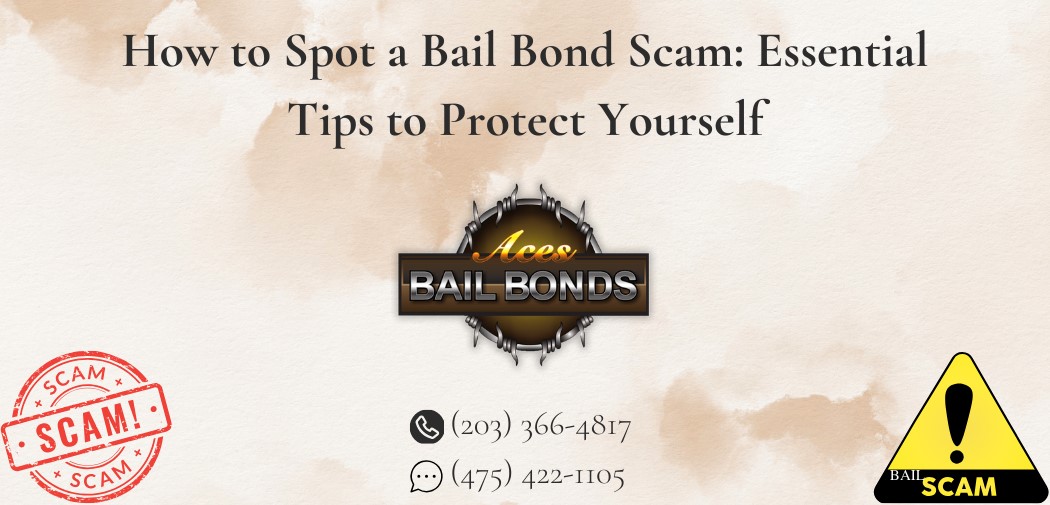How to Spot a Bail Bond Scam in Connecticut: Essential Tips to Protect Yourself
When a loved one is arrested, securing release through a Connecticut bail bond often becomes the top priority. Unfortunately, scammers prey on families during these stressful times. Knowing how to spot a bail bond scam can protect you from losing money and ensure you’re working with a licensed bail bond agent you can trust.
This guide explains the basics of bail bonds, common scams to watch for, and practical steps to protect yourself when choosing a bail bond company in Connecticut.
Understanding Bail Bonds
Before spotting scams, it helps to understand how bail bond services work.
-
Bail – Money set by a judge to guarantee a defendant returns for court.
-
Bail Bond – If the defendant can’t afford bail, a bail bondsman posts a bond for a non-refundable fee (usually 10% of the bail amount).
-
Responsibility – The bail bond company ensures the defendant appears in court. If the defendant skips, the bondsman may hire a bail enforcement agent (bounty hunter) to return them to custody.
With this foundation, you can better recognize when something seems off.
Common Bail Bond Scams
1. Excessive Fees and Hidden Charges
A legitimate Connecticut bail bond company charges a standard non-refundable fee (usually 10%). Scammers may demand inflated upfront payments or tack on hidden charges. Always ask for a clear breakdown of costs.
2. Unlicensed Bail Bond Agents
Every bail bondsman must be licensed in Connecticut. If an “agent” can’t show proof of licensing, walk away. You can verify licenses through the Connecticut Department of Insurance.
3. High-Pressure Tactics
Scammers often pressure families into signing quickly without time to think. A reputable bail bondsman will explain everything clearly and give you space to decide.
4. Collateral Demands Without Explanation
It’s common for a bail bond company to request collateral (like property or a vehicle). But if they refuse to explain why or how it’s used, it’s a red flag.
5. Too-Good-to-Be-True Deals
Beware of bail bond services offering unusually low fees. These “discount” scams often lead to hidden charges or outright theft.
How to Protect Yourself from Bail Bond Scams
✅ Research and Verify
Check online reviews, confirm licensing, and ask for referrals before choosing a Connecticut bail bond agent.
✅ Ask Questions
A trustworthy bondsman will answer questions about fees, contracts, and procedures. Evasion is a warning sign.
✅ Read the Contract Carefully
Never sign without reading the entire agreement. Look for hidden fees or unclear terms.
✅ Avoid Large Cash Payments
Use credit cards or checks whenever possible. Cash is harder to trace if something goes wrong.
✅ Trust Your Instincts
If the bail bond company seems shady or pressures you, walk away and find a licensed professional.
Recognizing and Reporting Bail Bond Scams
Warning Signs:
-
No license or credentials.
-
Fees much higher (or lower) than the 10% standard.
-
Refusal to explain terms or collateral.
-
High-pressure tactics to rush you.
Where to Report:
-
Connecticut Department of Insurance.
-
Better Business Bureau (BBB).
-
Federal Trade Commission (FTC).
Reporting scams helps protect others and ensures accountability in the bail bonds industry.
Conclusion
When dealing with an arrest, stress makes families vulnerable to bail bond scams. By knowing the warning signs, asking the right questions, and working only with a licensed Connecticut bail bondsman, you can protect your finances and secure reliable help.
At Aces Bail Bonds, we’re committed to honesty, transparency, and professionalism. We explain every step of the bail process, so you know exactly what to expect.
📞 Call (203) 366-4817 for trusted 24/7 Connecticut bail bond services.


